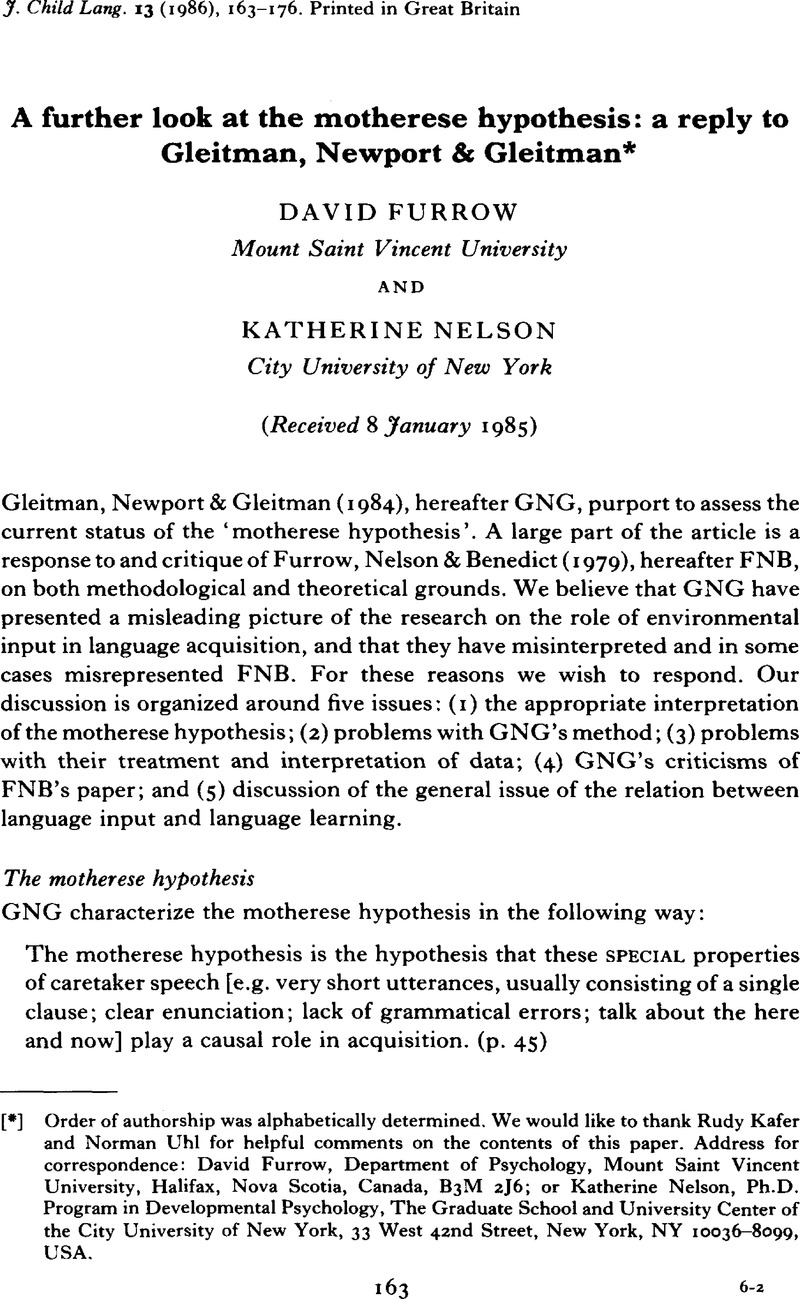Crossref Citations
This article has been cited by the following publications. This list is generated based on data provided by Crossref.
Weistuch, Lucille
and
Brown, Betty Byers
1987.
Motherese as therapy.
Child Language Teaching and Therapy,
Vol. 3,
Issue. 1,
p.
57.
Jones, Celeste Pappas
and
Adamson, Lauren B.
1987.
Language Use in Mother-Child and Mother-Child-Sibling Interactions.
Child Development,
Vol. 58,
Issue. 2,
p.
356.
Smolak, Linda
1987.
Child characteristics and maternal speech.
Journal of Child Language,
Vol. 14,
Issue. 3,
p.
481.
DURKIN, KEVIN
1987.
Minds and Language: Social Cognition, Social Interaction and the Acquisition of Language1.
Mind & Language,
Vol. 2,
Issue. 2,
p.
105.
Pepperberg, Irene M.
1988.
An interactive modeling technique for acquisition of communication skills: Separation of “labeling” and “requesting” in a psittacine subject.
Applied Psycholinguistics,
Vol. 9,
Issue. 1,
p.
59.
Feagans, Lynne
Robinson, Julie Ann
and
Anderson, Robert
1988.
Maternal attributions to a handicapped and a non-handicapped twin: a longitudinal study.
First Language,
Vol. 8,
Issue. 23,
p.
183.
Kegel, Gerd
1988.
Sprechwissenschaft & Psycholinguistik 2.
p.
97.
Farrar, Michael Jeffrey
1990.
Discourse and the acquisition of grammatical morphemes.
Journal of Child Language,
Vol. 17,
Issue. 3,
p.
607.
Pepperberg, Irene M.
1990.
Referential mapping: A technique for attaching functional significance to the innovative utterances of an African Grey parrot (Psittacus erithacus).
Applied Psycholinguistics,
Vol. 11,
Issue. 1,
p.
23.
Harkness, Sara
1990.
A cultural model for the acquisition of language: Implications for the innateness debate.
Developmental Psychobiology,
Vol. 23,
Issue. 7,
p.
727.
Pepperberg, Irene M.
Brese, Katherine J.
and
Harris, Barbara J.
1991.
Solitary sound play during acquisition of English vocalizations by an African Grey parrot (Psittacus erithacus): Possible parallels with children’s monologue speech.
Applied Psycholinguistics,
Vol. 12,
Issue. 2,
p.
151.
Edwards, Susan
1991.
Comparing how mothers and teachers talk to children: is it different and does it matter?.
Child Language Teaching and Therapy,
Vol. 7,
Issue. 3,
p.
298.
Pepperberg, Irene M.
1992.
Playback and Studies of Animal Communication.
p.
47.
Cicognani, Elvira
and
Zani, Bruna
1992.
Teacher‐children interactions in a nursery school: An exploratory study.
Language and Education,
Vol. 6,
Issue. 1,
p.
1.
Kwiatkowski, Joan
and
Shriberg, Lawrence D.
1992.
Intelligibility Assessment in Developmental Phonological Disorders.
Journal of Speech, Language, and Hearing Research,
Vol. 35,
Issue. 5,
p.
1095.
Lieven, Elena V.M.
and
Pine, Julian M.
1993.
Exposition et appropriation dans l’acquisition de la langue maternelle.
Acquisition et interaction en langue étrangère,
p.
143.
Sevcik, Rose A.
Romski, Mary Ann
Watkins, Ruth V.
and
Deffebach, Kim P.
1995.
Adult Partner-Augmented Communication Input to Youth With Mental Retardation Using the System for Augmenting Language (SAL).
Journal of Speech, Language, and Hearing Research,
Vol. 38,
Issue. 4,
p.
902.
Aukrust, Vibeke Gr⊘ver
1996.
Learning to Talk and Keep Silent about Everyday Routines: a study of verbal interaction between young children and their caregivers.
Scandinavian Journal of Educational Research,
Vol. 40,
Issue. 4,
p.
311.
Hadley, Pamela A.
Rispoli, Matthew
Fitzgerald, Colleen
and
Bahnsen, Alison
2011.
Predictors of Morphosyntactic Growth in Typically Developing Toddlers: Contributions of Parent Input and Child Sex.
Journal of Speech, Language, and Hearing Research,
Vol. 54,
Issue. 2,
p.
549.
Saint-Georges, Catherine
Chetouani, Mohamed
Cassel, Raquel
Apicella, Fabio
Mahdhaoui, Ammar
Muratori, Filippo
Laznik, Marie-Christine
Cohen, David
and
Senju, Atsushi
2013.
Motherese in Interaction: At the Cross-Road of Emotion and Cognition? (A Systematic Review).
PLoS ONE,
Vol. 8,
Issue. 10,
p.
e78103.



